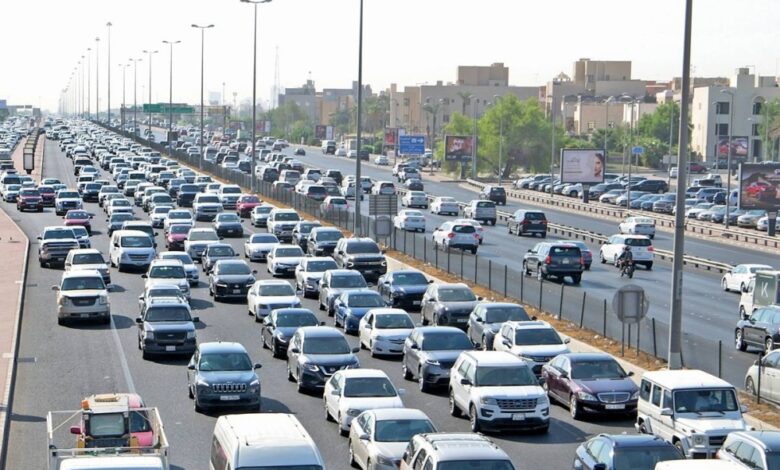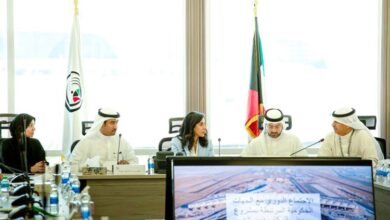Government greenlights solutions for traffic crisis

• Kuwait’s government addresses the traffic crisis with new recommendations.
• Focus on the rapid approval and implementation of the Kuwait Metro project.
• Emphasis on developing public transport and road infrastructure.
In a move aimed at tackling Kuwait’s traffic woes, the Council of Ministers has put the wheels in motion. The Kuwait Municipality recently received a letter from the General Secretariat outlining a series of recommendations originating from the Ministry of Interior.
Informed sources at Al-Jarida newspaper state that this letter urges the municipality to prioritize the implementation of the Ministry’s suggestions. These recommendations focus on three key areas: accelerating the issuance of necessary decisions, finalizing the feasibility study for a rapid transit system (Kuwait Metro), and determining the most suitable design and construction method for the metro project.
Kuwait Metro and additional mandates
The Kuwait Metro project is not a new idea. However, this comprehensive 48-page letter, a product of meetings between the Ministry of Interior, various entities, and the Legal Committee of the Council of Ministers, signifies the government’s renewed commitment to finally executing this long-awaited project and offering a permanent solution to Kuwait’s traffic gridlock.
But the metro project is just one piece of the puzzle. The Council of Ministers’ letter also assigns additional mandates to various concerned entities. These include finalizing the organizational and legislative framework for operating mass transit systems and overseeing the management of buses and other public transportation options.
The letter specifically instructs the municipality to urgently address the gaps in the Kuwait Metro’s feasibility study.
Additionally, the recommendations call upon the Ministry of Public Works to prioritize implementing projects for developing the road network. These projects include the second, third, and fourth ring roads, Damascus Street, and the Fahaheel Expressway.
The Ministry is also tasked with securing the necessary budgets for these endeavors. The General Secretariat has requested updates on these matters to ensure they can take appropriate follow-up actions.
Meeting outcomes
The impetus for this initiative came from a meeting held on March 3, 2024, at Seif Palace. The Ministry of Interior, along with representatives from relevant entities, convened to discuss the traffic crisis in Kuwait.
The General Traffic Department presented a report identifying several factors contributing to the congestion, including the lack of a comprehensive framework for managing mass transit operations and overseeing public buses and other transportation alternatives.
The Ministry emphasized the urgency of streamlining decision-making processes, finalizing the metro’s feasibility study, and selecting the most suitable design and construction method for the rapid transit system to accommodate Kuwait’s growing population.
A major topic of discussion was the delayed implementation of crucial projects designed to improve Kuwait’s road network.
These projects, for which the Traffic Department has already completed traffic studies and preliminary designs, include the second, third, and fourth ring roads, Damascus Street, and the Fahaheel Expressway.
The council recommended expediting the execution of these projects and allocating the necessary budgets.
The meeting also focused on organizational and legislative frameworks. As a conclusion, the traffic representative proposed some interim solutions to improve the efficiency of the fourth ring road while they await the execution of the consultancy agreement for its development.
The proposal involves using traffic count data, conducted by a consultant for the road, to determine actual traffic volumes.
Challenges and responses
Challenges were highlighted in a letter from the Council of Ministers. The letter revealed that the Ministry of Interior had contacted the Public Authority for Roads and Land Transport to conduct a comprehensive traffic study, considering all previous studies on key roads like the second, third, and fourth ring roads, and the Fahaheel Expressway.
The Authority, however, responded by suggesting the municipality conduct the study as they possess the latest traffic model data.
They also cited a lack of activated transfers of relevant departments to the Authority and a shortage of specialized national staff within the organization.
Strict licensing yet persistent congestion
The Ministry of Interior asserted that Kuwait is one of the strictest countries in issuing driving licenses. Despite this, the severe traffic congestion plaguing the country’s streets is a clear indicator and conclusive evidence of the imbalance between the demand for transport and the road network’s capacity in Kuwait.













